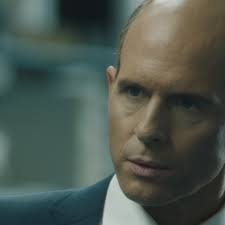After watching "Succession" on HBO, I watched "Generation Kill" for maybe the third or fourth time since it debuted in 2008. In Succession, Alexander Skarsgard (left) was a villain. In Generation Kill he is the moral center of the drama.
Generation Kill is a narrow view of the war itself, following one platoon. But it is a universal view of American soldiers since the end of the draft--the small all-volunteer slice of the country who serve in military.
------------
Generation Kill: An Iraq drama with a difference from the makers of The Wire
There's been no shortage of films and TV dramas depicting the horror of the 'war on terror' - with varying degrees of success. Generation Kill, which debuts in the UK in the new year, promises to tell it like it is
Sarah Hughes
Wed 23 Jul 2008
Is it possible to make a believable TV series about the Iraq war that people will want to tune in to?
In the case of Generation Kill, the new seven-part mini-series, the mere fact that is was penned by the co-creators of The Wire, David Simon and Ed Burns, will surely help.
The drama, which comes to the UK early next year on FX, has received largely positive reviews in the US in addition to garnering respectable, if not overwhelming, ratings.
Assassin, the platoon commander
We have been here before, of course. In 2005, the award-winning writer and producer, Steven Bochco, gave us Over There, which pulled few punches in its depiction of the casual horror of war but which was also criticised for a narrow vision, one which rarely lifted its focus away from the gun and the hands that held it.
Tony Marchant's 2007 British drama The Mark Of Cain was more interesting than Over There, but arguably more flawed. Marchant's tale of squaddies gone wrong in the Iraqi badlands was a ripped-from-the-headlines story of abuse and the corruption of power, which, despite some excellent acting and a strong script, rather collapsed in on itself after a torrid 90 minutes, when we found out that, as ever, the posh men at the top of the heap were ultimately to blame.
Godfather, the battalion commander
Nor has the ongoing conflict fared much better on film. In the past couple of years, audiences have largely chosen not to see the worthy Rendition, the dull Lions for Lambs, the self-important In The Valley of Elah, the polemical Redacted and the flawed-albeit-interesting Stop-Loss.
So can Generation Kill challenge convention and give us a good Iraq war drama or is it the case, as Bochco has argued, that this war is too immediate, its wounds too raw and recent, for anyone to want to watch?
Ray Person, the clown
The answer is complicated. On the one hand, Generation Kill is, to my mind anyway, the best Iraq war drama by some distance. On the other, that still might not be enough to convince people to tune in.
War, and this war in particular, remains a hard sell and it's doubtful that Generation Kill can challenge that wisdom. Which is a shame, because to miss out on this is to miss out one of the year's most powerful dramas.
As they did in The Wire, Simon and Burns thrust us instantly into a detailed, flawed world with its own immaculately realised customs, codes and language. It is a world where the soldiers are not simply heroes, but nor are they, as many both here and the US might have it, merely villains. Instead we are shown their day-to-day lives, their actions and arguments and asked to make our own judgment.
It's grown-up television that, in contrast to The Mark of Cain or Redacted doesn't shove its message down the audience's throat all the while screaming: "See, see, do you appreciate the awfulness of what's happening here?"
Yes, there are echoes of other dramas, including hints of Jarhead and Three Kings in the marines' dislocation, in the sense that for some of them this is war by way of Grand Theft Auto, flash, fast and furious. There are echoes too of the finest post-Vietnam drama of them all, Peter Kosminsky and Leigh Jackson's harrowing Warriors from 1999, which showed the terrible fallout of war on a British platoon working as peacekeepers in the former Yugoslavia.
Generation Kill, so far at least, lacks the unflinching vision that so marked Warriors out, but it has something that may yet turn out to be more interesting going for it - unlike almost every other war drama there is no particular sense that Generation Kill is building towards anything.
Instead, Simon and Burns (and by extension Evan Wright, whose Rolling Stone columns and book it is adapted from) appear to be saying this is a job; this is what these people do; this is how they act; there will be good days and bad days; terrible things may well happen but, then again, they may not. Some people do, after all, get through wars without much more than a scratch.
There will be those who complain that, by taking this attitude, the writers are ignoring the wider implications of Iraq, of everything that happened before and has happened since. But Simon and Burns are not attempting to lecture us, or even particularly to entertain us (although one of Generation Kill's biggest plusses is that it is frequently hysterically, darkly, funny). Instead, they seem intent on showing us, as they did with inner city Baltimore, that this is life, this is how people are living, look at it, think about it and later, when alone, make up your own mind where you stand.



























